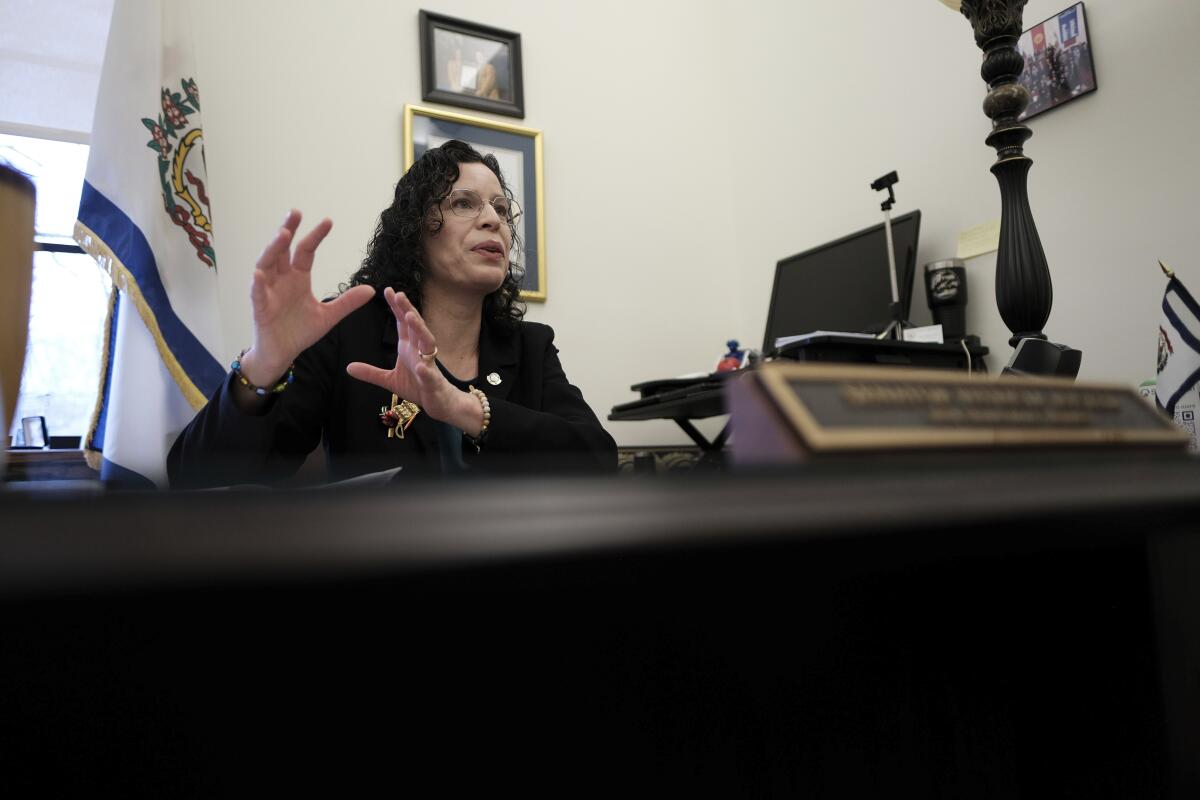Women remain vastly underrepresented in state legislatures, especially in the South

- Share via
CHARLESTON, W.Va. — Democrat Kayla Young and Republican Patricia Rucker frequently clash on abortion rights and just about everything else in West Virginia’s Legislature, but they agree on one thing: Too few of their colleagues are women, and it’s hurting the state.
“There are exceptions to every single rule, but I think in general, men do kind of see this as their field,” said Rucker, part of the GOP’s Senate supermajority that passed one of the nation’s strictest abortion bans while Young — the lone Democratic woman elected to the House — opposed it.
Nearly 130 years since the first three women were elected to state legislative offices in the U.S., women remain massively underrepresented in state legislatures.
In 10 states, women make up less than 25% of their state legislatures, according to Rutgers University’s Center for American Women and Politics. West Virginia is at the bottom of that list, having just 16 women in its 134-member Legislature, or just under 12%. That’s compared with Nevada, where women occupy just over 60% of state legislative seats. Similarly low numbers are found in the nearby Southern states of Mississippi, South Carolina, Tennessee and Louisiana.
“It’s absolutely wild to know that more than 50% of the population of West Virginia are women, and sometimes I’m the only woman that’s on a committee, period,” said Young, the only woman on the House Artificial Intelligence Committee and one of two on the House Judiciary Committee when it greenlighted the state’s near-total abortion ban.
The numbers of women filling legislative seats across the U.S. have remained low despite women registering and voting at higher rates than men in every presidential election since 1980 — and across virtually every demographic, including race, education and socioeconomic status.
For the last three decades, voters have demonstrated a willingness to cast ballots for women. But they didn’t have the opportunity to do so because women weren’t running, said Jennifer Lawless, chair of the politics department at the University of Virginia.
France enshrines the right to abortion in its constitution, a powerful message of support for women’s rights on International Women’s Day.
“The gender gap in political ambition is just as large now as it was then,” said Lawless, adding that women are much less likely to get recruited to run for office or think they’re qualified to run in what they perceive as a hostile political environment. And those running in Southern, conservative states — still mostly Democratic women, data show — aren’t winning as those states still overwhelmingly elect Republicans.
In 2022, 39 women ran as their party’s nominee for legislative seats in West Virginia, and 26 were Democrats. Only two of the Democrats won, compared with 11 of 13 Republicans.
Debbie Walsh, director of the Center for American Women and Politics, said there’s more money, infrastructure and support for recruiting and running Democratic female candidates. The Republican Party often shies away from talking about what is labeled or dismissed as “identity politics,’” she said.
Larissa Martinez, founder and president of Women’s Public Leadership Network, one of only a few right-leaning U.S. organizations solely supporting female candidates, said identity politics within the GOP is a big hurdle to her work. Part of her organization’s slogan is, “We are pro-women without being anti-man.”
In 2020, small-town teacher Amy Grady pulled off a huge upset when she defeated then-state Senate President Mitch Carmichael in West Virginia’s Republican primary after back-to-back years of strikes in which school employees packed into the Capitol.
In swing states, where Biden doesn’t have a big Democratic cushion to protect him, the impact of independent and third-party candidates could be enough to swing the outcome to Trump.
Carmichael took in more than $127,000 in contributions, compared with Grady’s self-funded $2,000. Still, Grady won by fewer than 1,000 votes.
“It’s just you’re told constantly, ‘You can’t, you can’t, you can’t do it,’” said Grady, who has risen through the ranks to become chair of the Senate Education Committee. “And it’s just like, why give it a shot?”
Tennessee state Sen. Charlane Oliver says she didn’t have many resources when she first raised her hand to run. She had to rely on grassroots activism to win in 2022.
Yet securing the seat was just part of the battle. Oliver, a 41-year-old Black Democrat, is frequently tasked with providing the onlyoutside perspective for the Republican supermajority Legislature.
“They don’t have any incentive to listen to me, but I view my seat as disruption and give you a perspective that you may not have heard before,” she said.
Many male-dominant statehouses have enacted strict abortion bans in GOP-controlled states since the U.S. Supreme Court overturned Roe vs. Wade in 2022. For many female lawmakers, this trend has meant sharing deeply personal stories surrounding abortion and childbirth.
In South Carolina, the abortion debate resulted in an unlikely coalition of women banding together to filibuster a near-total abortion ban. The five female senators — three Republicans, two Democrats and one independent — quickly became known as the “sister senators” as they took turns describing pregnancy complications, the dangers surrounding limited access to contraceptives and the reproductive system.
Their actions were met with praise from national leaders, but at home, the consequences have been swift. The Republican women received censures and promises of primary challenges in this year’s elections.
Women also have championed gun policy, education, healthcare and housing proposals.
Recently, some states have allowed candidates to make child care an allowable expense for campaign finance purposes. Young was the sponsor of her state’s law — one of her priorities her first session in the Capitol in the minority party.
During Young’s first term in office, she relied on a family member who would care for her two young children while he was at the state Capitol. But she was left without a solution last year when that caregiver died unexpectedly days before the session. Her husband, who works in television production, had to stay home and didn’t work for two months, meaning the family lost out on his income.
Young’s bill won the vote of Rucker, the first Latina elected to the West Virginia Senate. She too has had to juggle the challenges of being a working mom. She left her job as a teacher to home-school her five children, and the family relied on her husband’s salary as a pediatric nurse to make ends meet.
“I ran for office because I feel like having that voice is actually really important — someone who lives paycheck to paycheck,” said Rucker, a first-generation U.S. citizen. “I’m not here because of a title, I’m not here because of a position; I’m here to do my job, and I want to do the best I can.”
Willingham and Kruesi write for the Associated Press. Willingham reported from Charlston, Kruesi reported from Nashville. AP journalist James Pollard in Columbia, S.C., contributed to this report.
More to Read
Get the L.A. Times Politics newsletter
Deeply reported insights into legislation, politics and policy from Sacramento, Washington and beyond. In your inbox twice per week.
You may occasionally receive promotional content from the Los Angeles Times.












